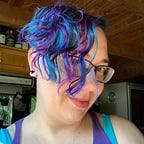The Isolation is Real: 7 Months into the Covid Pandemic and Counting
This is all very important — trusting in the science we’ve learned surrounding Covid and staying distanced and outdoors and masked — and I’m very grateful that Robin Schoenthaler has been writing these informative and accessible posts during this pandemic. I believe in the science (not that science functions on belief) and I’ve been pretty strict with regard to limiting my covid risk.
And yet as I’ve head from friends over and over again, the strict science here and the generally used language of sharing space only with one’s family leaves many of us behind.
We live in a society that values individualism (read: isolation) over everything. You have to be able to do it* by yourself or you’re failing somehow. In challenging times past when outside events have changed the course of human life, the majority of people lived near their families, and if not, in another community structure. So many of us today, younger adults especially, but a large, and I suspect growing, number of folks in other age brackets as well**, live elsewhere. With roommates who were strangers before moving in. Without family or chosen family. With partners or friends or acquaintances who don’t celebrate the same holidays, or together. By themselves.
Many of us are already suffering from extreme anxiety. From exacerbated depression. From the fundamental lack of community, of tribe, of belonging, that this already extended social isolation engenders. The fact that we’re using “social distancing” rather than “physical distancing,” or some other terminology of that ilk, highlights the actuality of what many of us are facing — at a time of great challenge, when we human animals most need to feel supported in our communities, we are, in fact, largely alone. It is painful and dangerous, albeit a different kind of painful and dangerous than the virus itself.
I spent the last two Thanksgivings alone***, and pretended that was okay, but in reality, it was deeply depressing. The anticipatory anxiety has already begun, along with the mood effects of fewer sunlight hours and cooling weather that many of us experience. I am deeply concerned about the increased mental health risks this coming holiday season, with the break with traditions either familial or personal, and with the added impacts of no longer being able to meet with loved ones out of doors, distanced and masked, to meet some modicum of social interaction needs.
Personally, I’m staring down the barrel of being a bubble of one, as I look for less temporary housing. Given how disappointing my Halloween was without being able to gather (my favorite holiday, though not one of the culturally Big, Important Ones), I’m also staring down the barrel of a deep and uncomfortable loneliness and probably depression. What do we do, those of us who are not bubbled with our families, biological or chosen? How do we integrate the realities of what science is telling us to stay physically safe with our mental health needs, especially those of us who are particularly at risk in both those categories?
Unfortunately, I don’t have any answers.
*Life.
**It’s us folks in our mid 30s who I’m mostly hearing from, and I guess we no longer really qualify as “young adults,” really, but because the realities of the Millennial generation, many of us are still early-career and/or in relatively unstable positions and without the trappings of adulthood we expected by now.
***Traveling was too challenging (expensive, time consuming, not possible with my work schedule) and my food allergies prevented me from joining any “Friendsgiving” type situations.
